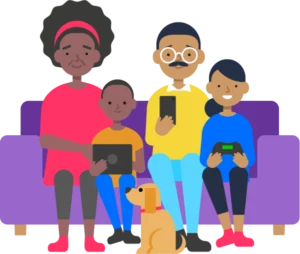CGI Instagram and YouTube stars developed by AI tech companies on the rise which are becoming increasingly popular amongst young people and children.
We want to encourage parents with advice on how to help their children be more critical of online content – following the rise of the AI influencer.
Summary
- AI influencers are CGI or deepfake creations used for marketing.
- Parents struggle to know which content is suitable for kids.
- Experts warn of potential ‘damaging effects’ on wellbeing.
- There are steps you can take across platforms to build digital resilience.
- Explore resources to find more support.
What is an AI Influencer?
AI influencers are made via CGI (computer-generated imagery) by companies to make their influencer marketing campaigns more effective. Lil Miquela, Blawko, Bermudaisbae and Shudu are some of the more popular personalities on an ever-expanding list of artificially created social media stars who are changing the narrative around the future of the online celebrity. They look very realistic, move and express emotions like humans.
Parents are being encouraged to have a conversation with their kids about ‘picture perfect’ virtual influencers and the risks they may pose to their wellbeing including online manipulation. A study carried out by researchers at Toyohashi University of Technology showed humans are able to empathise with robots in a similar way to how they do with humans.
Brands using AI influencers can potentially use this emotion to help them monetise engagement and manipulate users into buying their latest products. In many cases, the AI influencers image has been designed by gathering data on trends and bringing those trends into one picture-perfect image – to increase popularity.
Why are parents concerned?
New research has found that two-thirds of parents (65%) have concerns that the lives portrayed in online vlogs give kids unrealistic expectations about real life. While 69%* of parents admit they find it difficult to know whether certain vlogs or vloggers are suitable for their kids.
Organisations and companies create virtual influencer accounts in a bid to cash-in on social media trends and help raise awareness of brands among an online audience. The computer-generated aspirational images posted by the virtual influencers, often include portrayals of the perfect body or lifestyle that are unattainable.
What the experts say
Psychologist Dr Linda Papadopoulos has warned of the potential ‘damaging effects’ virtual influencers can have on a child’s self-esteem, body image and understanding of ‘real life’.
She said: “The new iteration of the virtual influencer gives brands and corporations the ability to create posts that feature perfect men or women who can speak to a largely young audience at the click of a button. Parents need to equip their children with all of the information. Speak to your child about these accounts in the same way you would with a real-life influencer, encourage your children to think critically about what they are viewing.
Get them to de-personalise these accounts by asking some key questions, who is creating these posts, who are they targeting, why are they wearing those clothes and promoting those products? Allowing your child to ask questions will highlight to them the manipulated nature of these accounts and images.”
CEO of Internet Matters Carolyn Bunting said: “Technology is evolving at a rapid pace and AI influencers are the latest way for tech companies to reach their target market.
It’s essential parents get to grips with the latest emerging online trends and have regular, open and honest conversations with their children about what they see and consume online.
Improving a child’s digital literacy and building their resilience is the best way to empower them to navigate their own online world both safely and responsibly.”
Improving a child’s digital literacy and resilience
We want to encourage parents to empower their children to think critically about what they are consuming online and have created age-specific digital resilience guides in response.
Below, we have devised tips for parents on how to protect their children from the digital manipulation of virtual influencers across the top online platforms including Twitter, Instagram, Facebook and YouTube:
- Go to your account
If your child comes across an image on their discovery page or on their timeline of an account they don’t know, make sure they are clicking through and viewing the main page of that person’s account. - Check out bio
Encourage your child to look at the influencers’ Instagram bio, many of these virtual influencer accounts state that they are in fact ‘robots’ in their bio. - Look beyond the ‘blue tick’
Let your child know that just because they have a ‘blue tick’ signifying they’re verified by Instagram as a personality, it does not mean they are real. Advise them to read their description. - Check if images are real
Scroll through the images on the account to get a better view of what’s real and what’s not. Once you view more than one photo, the fact that they are CGI-generated will become clear through appearance but also their robot-themed captions and hashtags. - Explain why brands use AI accounts
Inform your child that these accounts have been created by a team of people to be used by brands. Discuss with them the purpose of these influencers and how and why they exist.
Twitter/X
- Check profiles of influencers
Before your child engages with a tweet, encourage them to click onto the virtual influencer’s profile in order to get more information about them. - Look through the influencer’s twitter timeline
Remind them to look past just the one tweet and look at the person’s interactions with other accounts, often they will announce that they are a ‘robot’ further down their timeline. - Discuss things that could be fake on these accounts
Go through these accounts together and discuss the aspects that appear real but are fake, such as the interactions between other accounts on their page. - Talk about how these ‘digital influencers’ are created
Although these accounts can be fun, make sure your child knows that they are run by a team of people and are in fact part of a larger group of CGI influencer accounts, explain to them that they are often a tool to sell products or promote brands.
YouTube
- Discuss what to watch out for
For video, it’s much easier to see that these profiles are CGI-generated personas but it’s still important to talk to your child about who they are and highlight the fake nature of the content. - Encourage kids to be critical of what they see
Sometimes these videos may include a real influencer and a CGI one, these videos are harder to detect at first glance. Encourage your child to look closely at the people in the video, do they look like a video game character in comparison to the other person in the video? Does their voice match up to their mouth movements? - Make sure they know to ask if they are unsure
Let your child know they can always come to you if they are unsure whether or not the influencer featured is a real person or not. - Talk about who’s in control of these ‘digital influencers’
Remind your child that they are not interacting with one person but with a whole team of people who have created this content, encourage them to think critically about the origin of the video and what it’s trying to convey (i.e. brand-led content trying to sell products).
- Help them understand the difference between official and unofficial fan pages
Speak to your child about the existence of fan page Facebook pages, let them know that there is a mixture of both official and unofficial fan pages and accounts. - Encourage kids to check out who someone is before accepting the request
Ensure that your child doesn’t accept any requests from accounts without first exploring if any official accounts for this person exist. - Discuss if they actively follow digital influencers
Speak to your child about who they are Facebook friends with and ask them if they are following any virtual influencer accounts and then check if they are following the official page. - Encourage them to be mindful of the intentions of those running fan pages
If your child is a member of any virtual influencer fan pages, remind them that it could be run by anyone and is still not a safe space. - Agree digital boundaries on how and who they interact with online
Set boundaries on how many accounts they can be a member of and make sure they check with you before joining any new ones.
*Research commissioned by Internet Matters, carried out by Trinity McQueen of 2,000 UK parents of children aged four to 16.
**Survey of 2,022 parents of children aged 14-16 years old in the UK






